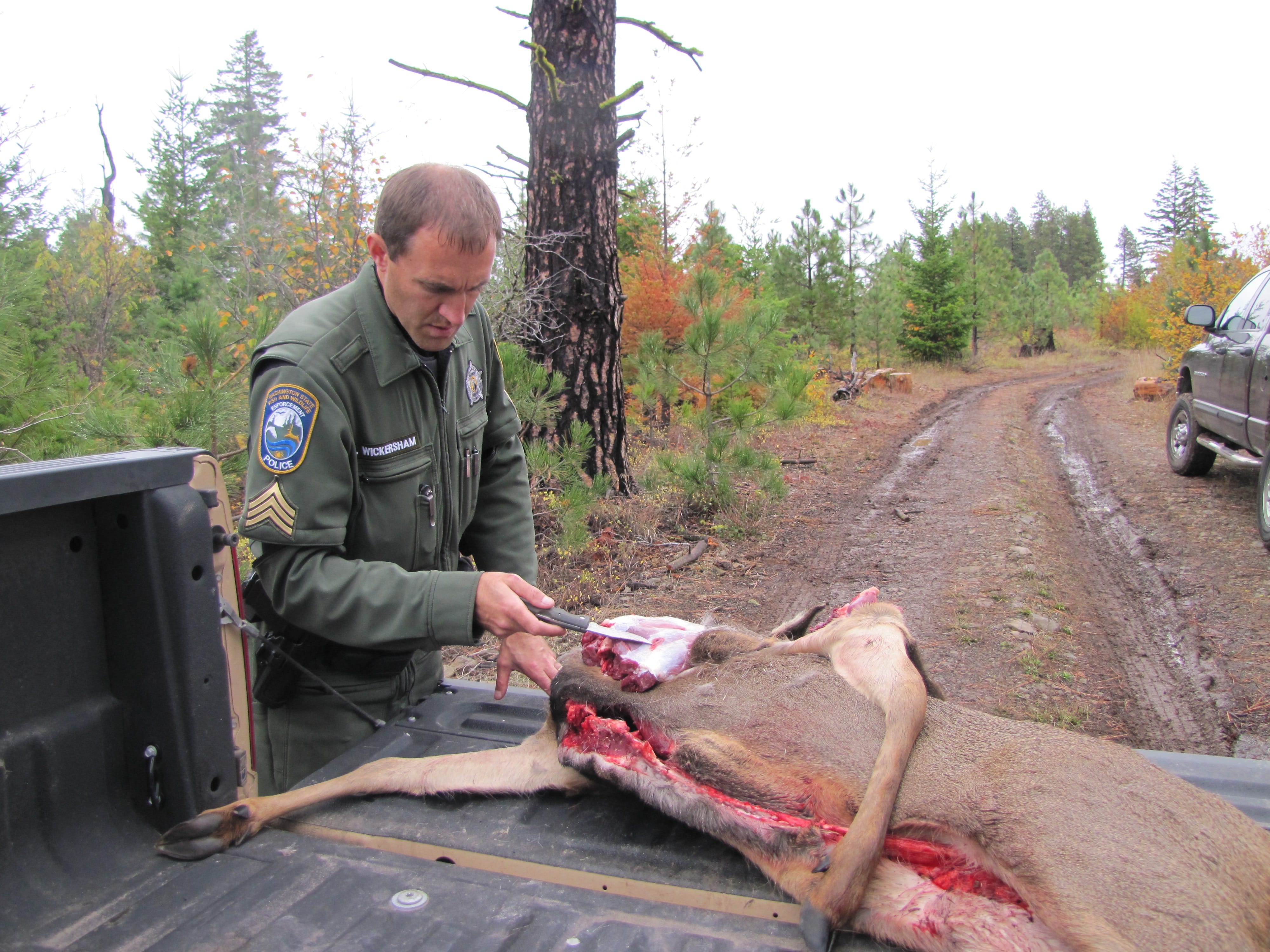Like most jobs, the duties of Sgt. Jeff Wickersham of the Washington Department of Fish and Wildlife Police are a mixed bag of enjoyable tasks and some not too pleasant at all.
On Sunday, I spent 10 hours riding with Wickersham in the West Klickitat and Grayback game management units as he worked the second day of Washington’s modern firearm rifle deer season. I’d guess we put 150 miles on his Ford F250 patrol truck, which was about half that of his 13 ½-hour, 350-mile day on Saturday’s rainy opener.
A graduate of Washington State University in Pullman with a major in Natural Resource Science and a minor in Criminal Justice, Wickersham grew up in Clark County. Now a resident of Stevenson, he supervises seven officers in Clark, Skamania and Klickitat counties.
Here are some of my observations from the day:
The enjoyable: Wickersham stopped and chatted with a father accompanied by two elementary-school age sons searching a hill side near the Klickitat River with their binoculars. He encouraged the boys to be sure and help dad if the trio got a buck.
“I’m glad to see that,’’ Wickersham said, about the two boys. “Recruitment of young hunters is on the decline. I wish there was a way to get more of them in the outdoors and hunting. The 16- to 30-year-old age group is, for the most part, conspicuously absent.’’
The sweaty and bloody: A local hunter, who wished to remain anonymous, called Wickersham about 11:30 a.m., and reported finding a freshly killed spike buck in the West Klickitat unit, which has a three-point antler minimum.
In Goldendale when the call came, Wickersham hurried to the Snowden area and met the hunter, whom he knew from previous seasons. The hunting party that had poached the spike were field dressing it when the reporting party spooked them, and they fled the scene. But the hunter found a bullet casing and had a description of the culprits’ vehicle.
The hunter lead Wickersham and I to the carcass.
Here some of the dirty work — literally — began. The three of us dragged the deer body out of a steep ravine for about a quarter-mile to Wickersham’s truck.
“Without a license plate number, there’s probably a 15 percent chance we’ll be able to make this case,’’ he said. “But there’s still a lot of deer season left and we’ll keep looking.’’
The complicated: A ruling by the U.S. Ninth Circuit Court of Appeals in 2014 in the case of Tarabochia v. Adkins has further defined when fish and wildlife police can — and can’t — stop citizens afield.
The case originated from a 2007 stop of a commercial fishing family in Wahkiakum County.
To oversimplify the Tarabochia ruling, it says officers need a reasonable suspicion of a violation in progress to stop a vehicle.
“We can’t stop a vehicle simply because there’s a deer in the back of it during an open season,’’ Wickersham said. “People in a vehicle have a greater expectation of privacy.’’
But if the vehicle is already stopped, or if the hunter is “in the field,’’ then an officer’s inspection authority has not changed.
“No doubt, it’s made our job harder,’’ Wickersham said. “Encountering violations of possessing a loaded gun in a vehicle are way down. But we’re still able to find the bad violators. Most of those are not from an encounter from a chance inspection anyway.’’
The computer: Patrol vehicles are equipped with laptop computers stationed in the middle of the front seat. As expected, the laptops allow officers to check for previous violations.
There’s also a real-time mapping application giving very specific information about land ownership and other relevant information at their current location, including information on the whereabouts of other officers statewide.
Ticket quotas: Wickersham says he has no hard number for citations for himself or his detachment.
“Officers should be getting in the same range of others, give or take 20 percent, when they work a similar area,’’ he said. “I want to see my officers mixing it up — working significant resource violations, working odd hours, having presence in remote reaches of a game unit where violations are hard to get at, and working unpredictable schedules.’’
Deer season versus elk season: From a law enforcement perspective, the two major big-game seasons are very different.
“In my mind, deer hunters and steelhead fishermen are similar,’’ Wickersham said. “Deer don’t herd and steelhead are spread across a lot of water. Elk hunting is more like salmon fishing — they are in a smaller space and people know where they are concentrated.
“Deer hunting and steelhead fishing often require a different mindset than elk hunting and salmon fishing.’’




